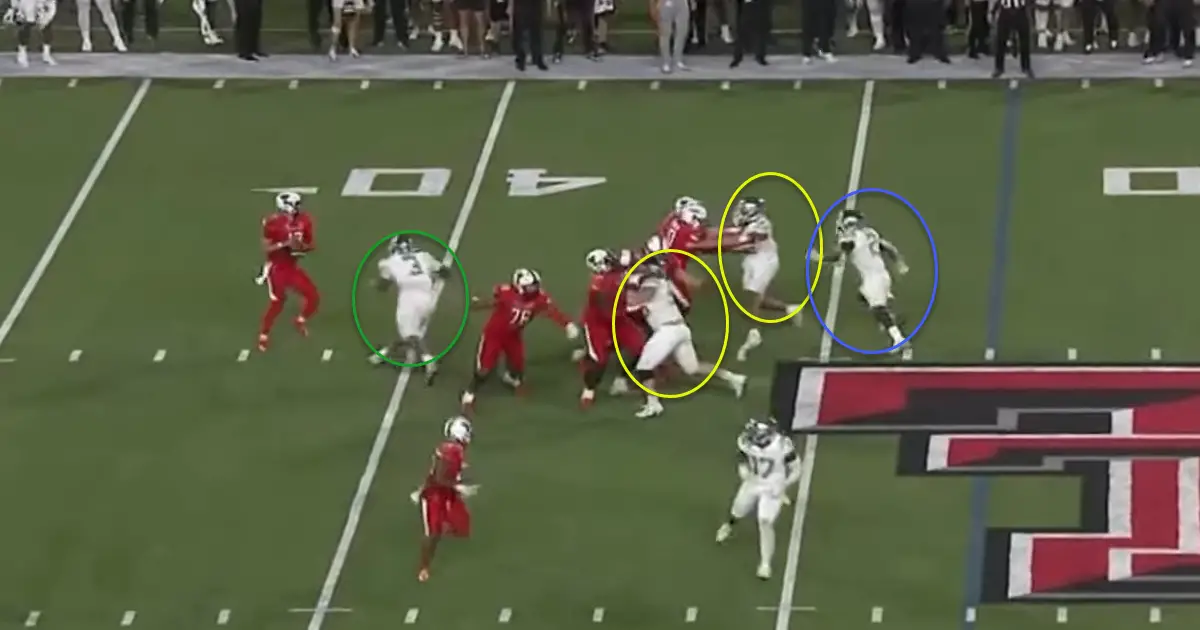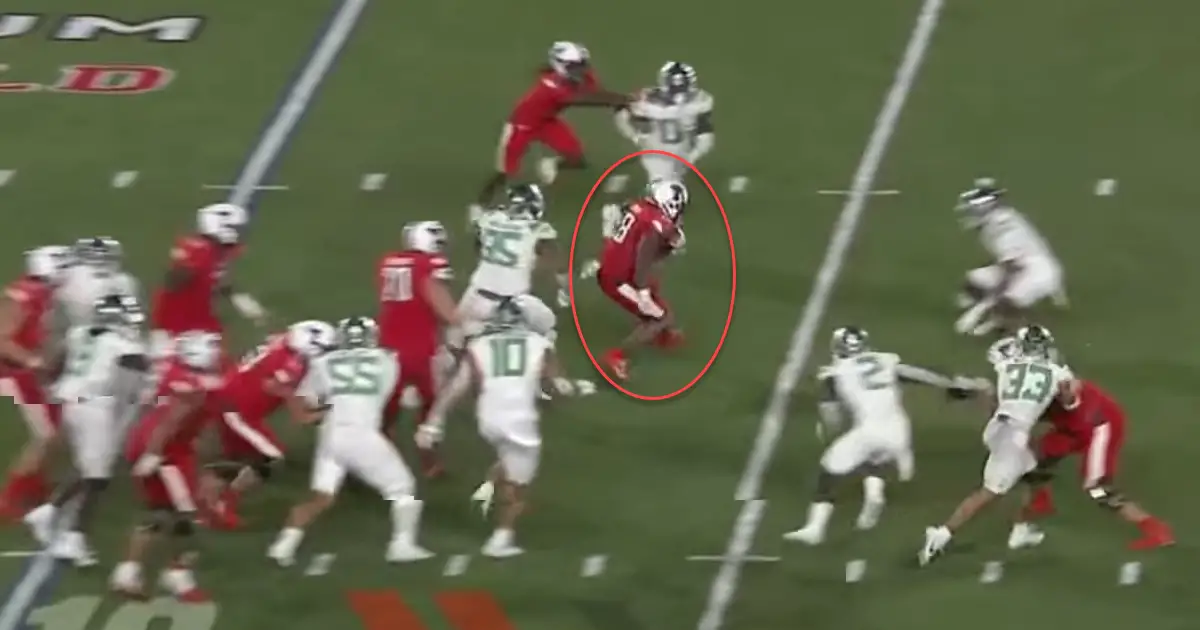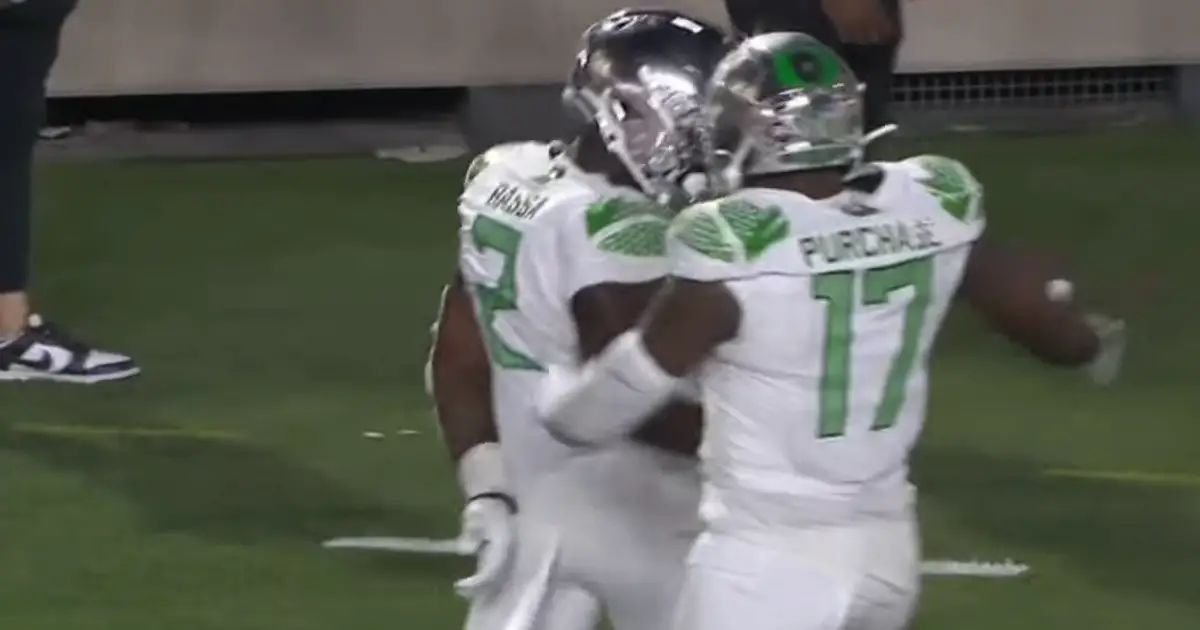Oregon’s defense found itself exposed on numerous occasions Saturday against Texas Tech, but what was clear is that this defensive front just oozes with potential. Mr. FishDuck pulled himself for a bit from the great sports site Overtime Heroics to agree with me on what we saw in Lubbock.
Perhaps the most noticeable change over last year was Oregon’s pass rush. Dan Lanning’s defense typically rushes four as part of his simulated pressure packages but at times Oregon was only rushing three against Texas Tech and, for the most part, Oregon’s pass rush was defeating Texas Tech’s offensive line even with plenty of double teams.
Against Texas Tech, Oregon recorded four sacks, five tackles-for-loss, and perhaps most importantly forced four turnovers, one of which was a critical pick-six. These are numbers that Oregon’s defense from last year never produced, let alone against a pass-heavy offense. Texas Tech quarterback Tyler Shough played incredibly well and there was a good amount of their game plan designed to get the ball out fast, but Oregon’s pass rush was disruptive and forced a lot of throw-aways. It also threw off his timing on some deeper balls.
This is the new and improved pass rush. It was Oregon’s glaring weakness last year, but this year it is probably the strength of the defense. The pass rush was, at times, so dominant that it consistently drew penalties from Texas Tech’s offensive line. Sometimes the only way Texas Tech could stop the pass rush was to grab the defenders to lock them up, which of course can draw a flag. Looking back at some of the replays, it is clear that there were some missed holding calls as well.

(Photo from Pac-12 Media YouTube)
In the photo above you’ll see the critical pick-six play at the end of the game. Oregon rushed three defenders and Jeffrey Bassa, blue circle, is on a delayed rush while also working as a quarterback spy. Brandon Dorlus, green circle, already beat his single defender and is free to go after the quarterback. Meanwhile the remaining four Texas Tech linemen are engaged on just two Oregon defenders, yellow circles. Shough is hit as he throws and the ball flies right into the arms of Bassa, who runs uncontested for a touchdown.
This play shows just how disruptive the Oregon defensive front is when everyone does their job. There are too many highly skilled players on Oregon’s defensive front to contain, so there should always be someone running free to make a play.
Stopping the Run
Stopping the run — in particular the quarterback run — is going to be an ongoing job for this coaching staff and players. Texas Tech had far too many big runs and averaged over five yards per carry. Shough had one run that accounted for over 50 yards and set up the first Texas Tech touchdown. This was also a problem against Portland State where PSU’s only successful scoring drive was set up by an explosion play by a quarterback run.
Part of this problem against Texas Tech may have been somewhat by design as Texas Tech is a pass-heavy, air raid style offense — but containing the quarterback and not letting him run for chunk yardage on a broken play is going to be key.
Later on in the season Oregon is going to have to contend with Caleb Williams, and even though the USC offensive line is suspect, the Oregon defensive line can’t get carried away with the pass rush to the point where gaps open up for a quarterback to run for big yards.
The other major issue with the run defense is the tackling. Oregon made first contact with a runner at or behind the line of scrimmage regularly, but they just couldn’t bring the runner down. These missed tackles opened holes for the runners to pick up extra yards when they should have been stopped for little or no gain. This is a technique issue that every player should know at this point in their college career, but they need to actually do it. The defenders were in the right spot at the right time but failed to complete the job.

(Photo By Pac-12 Media YouTube)
Above you can see the Texas Tech running back surrounded by Oregon Ducks right after he crosses the line of scrimmage. Oregon ended up missing this surefire tackle and the runner took at least another 10 yards to be brought to the ground. This run should not have resulted in a first down, let alone additional yardage after the first down marker.
Oregon’s defense at times looked unstoppable against Texas Tech where the Red Raiders struggled to move the ball and Shough was under constant duress. He may have only taken four sacks, but he took a lot more hits than just the four that were recorded. This Oregon team has all the potential to make a run at the playoff, but they are going to need to get their heads right and clean up their mistakes against Hawaii so they can be ready when conference play begins against Colorado.
David Marsh
Portland, Oregon
Top Photo By Pac-12 Media From YouTube

David Marsh is a high school social studies teacher in Portland, Oregon. As a teacher he is known for telling puns to his students who sometimes laugh out of sympathy, and being both eccentric about history and the Ducks.
David graduated from the University of Oregon in 2012 with Majors in: Medieval Studies, Religious Studies, and Geography. David began following Ducks Football after being in a car accident in 2012; finding football something new and exciting to learn about during this difficult time in his life. Now, he cannot see life without Oregon football.

